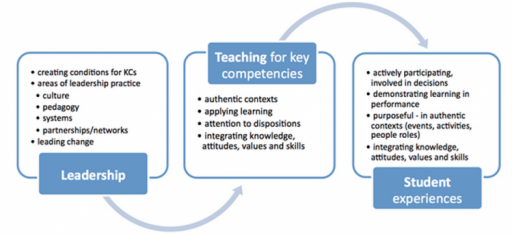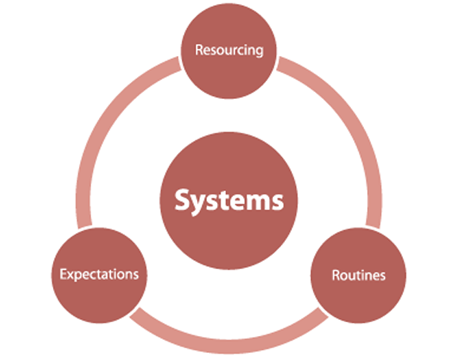Leadership and the key competencies
Learners are most likely to develop and strengthen their capabilities for living and learning when they learn with teachers in a school whose leadership creates conditions that stimulate key competencies.
The key competencies element of The New Zealand Curriculum brings with it exciting possibilities for making students’ experience of learning more relevant, engaging, meaningful, and useful. Key competencies-rich programmes will enable students to be confident, connected, actively involved learners in the present and in the future. They will encourage lifelong learners who are equipped to participate in rapidly changing local, national, and global communities.
Giving effect to key competencies in ways that address their complexity will entail significant challenge and change. Tackling those challenges and compelling change to support key competencies is a vital role for school leadership. Effective leaders create the conditions required for key competencies in teaching and learning. They need to ensure that the culture, pedagogy, systems, partnerships, and networks in their school support key competency development. Leaders also need knowledge and skills in leading change since, for many, key competencies require, and make possible, a significant change in practice.
View a text version of this diagram.
Systems
Systems: Do our school systems support the kinds of changes that key competencies require?
Systems such as such as self-review, external review, performance management, student assessment and reporting, curriculum organisation and timetabling, need to be coherent with the intentions of the New Zealand Curriculum. Do these currently impact on the development of the key competencies, or is there potential for improvement?
Key competencies lead teachers to reconsider their approach to teaching and learning with students. Similarly they prompt school leadership to reconsider the extent to which school systems support the key competencies. School routines, expectations, and resourcing will all require consideration.
Do decisions about, and allocation of, resources (people, time, materials and money) reflect the aspirations key competencies lead us to have for teaching and learning?
Are the routines and expectations for all members of the school community (learners, staff, parents, whānau) conducive to the development of key competencies?
Leaders can support the development of key competencies by ensuring that school systems and environment are conducive to the goal.
Systems include routines/processes/procedures, expectations, and resourcing (people, time, materials and money).
To what extent do school systems support teachers to:
- be responsive to what they notice about students’ learning
- be responsive to what they notice about students’ competencies
- show themselves as learners
- focus not only on what, but on how students are learning
- consider students’ learning dispositions
- empower students as decisions makers
- make connections across learning areas?
To what extent do school systems support teachers and learners as they:
- integrate knowledge, skills, attitudes, and values
- demonstrate key competencies in performance
- demonstrate key competencies in different, increasingly complex contexts
- apply their learning in authentic contexts
- consider how ready, willing, and able they are to learn
- share in decision-making roles
- make connections across learning areas?
Published on: 06 May 2014
Return to top


